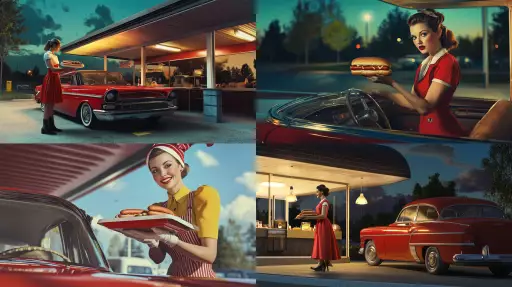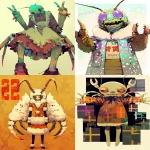Explore the Best AI Image Gallery

Quantum Creativity: Unlocking New Frontiers in the Arts
The intersection of technology and art has always been a fertile ground for innovation. From the Renaissances mastery of perspective to the digital revolutions embrace of pixels and code, artists have continually pushed boundaries, seeking new ways to express themselves and engage audiences. Now, on the horizon, we see another paradigm shift—one driven by the burgeoning field of quantum computing.
Quantum computers, with their ability to harness the principles of superposition and entanglement, promise to unlock unprecedented computational power. This leap forward has far-reaching implications for various industries, but perhaps none as profound as the creative sector. Imagine a future where artists can design interactive sculptures that respond to viewers emotions, generate realistic CGI characters with unparalleled nuance, or compose music that evolves in real time based on audience input—all powered by the magic of quantum mechanics.
Potential Uses: A Quantum Leap for Creativity
- Interactive Art Installations: Quantum computers could enable artists to create immersive, responsive installations that react to viewers movements, thoughts, or even physiological responses. Imagine a sculpture that shimmers and changes color based on the viewers heartbeat or a painting that evolves in real time with their emotional state.
- Generative Design and Music: Quantum algorithms could be used to generate unique and complex designs for sculptures, buildings, or even fashion. In music composition, imagine AI-powered systems that create entirely new melodies and harmonies based on a users input or mood, pushing the boundaries of sonic exploration.
- Personalized Storytelling: Quantum computers could enable the creation of highly personalized narratives tailored to individual viewers. Imagine interactive movies where your choices directly influence the plot, or virtual reality experiences that adapt to your unique preferences and emotional responses.
Ethical Considerations: Navigating Uncharted Waters
As with any powerful technology, quantum computing raises important ethical considerations for the creative industry. Its crucial to address these concerns proactively to ensure responsible and equitable development:
- Copyright and Ownership: Who owns the copyright to artwork generated by quantum algorithms? How do we protect the intellectual property rights of artists in a world where AI can create original content?
- Bias and Representation: Quantum algorithms are trained on data, and if that data reflects existing societal biases, the resulting creative outputs could perpetuate harmful stereotypes. Its essential to ensure diversity and inclusivity in the training data to mitigate bias.
- Accessibility and Equity: Access to quantum computing resources may initially be limited to large institutions or corporations. We must strive to make this technology accessible to independent artists and creators to foster a more equitable creative landscape.
Future Trends: A Quantum Canvas for Artistic Expression
The future of creative expression is deeply intertwined with the evolution of quantum computing. Here are some key trends to watch:
- Quantum-Enhanced Design Tools: Expect to see powerful new software tools that leverage quantum algorithms to accelerate design processes, enable complex simulations, and generate innovative solutions.
- Emergence of Quantum Art Forms: As our understanding of quantum mechanics deepens, we may witness the emergence of entirely new art forms that harness the principles of superposition and entanglement in unique ways. Imagine sculptures that exist in multiple states simultaneously or paintings that shift and evolve based on quantum phenomena.
- Increased Collaboration Between Artists and Quantum Scientists: Well see a growing convergence between artistic communities and quantum researchers, fostering cross-disciplinary collaboration and pushing the boundaries of creative innovation.
Quantum computing is poised to revolutionize the way we create, experience, and interact with art. By embracing this transformative technology responsibly, we can unlock new frontiers in artistic expression and shape a future where creativity knows no bounds.




](https://images.ai-img.art/thumbnails/150/124afc0facac1c0c676099ab4d2aae88da73c9ba0b89d1f6de454d8b236458ef.webp)

